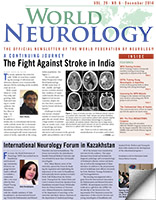By Donald Silberberg, MD
Epidemiologic studies address many needs, ranging from contributing to the understanding of disease pathogenesis to stimulating the development of public policy that addresses health needs. A successful example of the potential for new information to stimulate public policy is the nationwide study of the prevalence of neurodevelopmental disorders in India, carried out by members of the International Clinical Epidemiology Network (INCLEN).
When I suggested the study 10 years ago, almost no data was available for India or for neighboring countries. After successfully obtaining funding from the U.S. National Institutes of Health (NIH), the voluntary health organization Autism Speaks and The Government of India, Dr. Narendra Arora, then the newly appointed executive director of INCLEN, hosted meetings in New Delhi in order to develop the study.
The investigators included, in addition to Dr. Arora, MKC Nair, director of the Child Development Center, Medical College Thiruvananthapuram, Kerala; Sheffali Gulati, pediatric neurology chief, All India Institute of Medical Sciences, New Delhi; Vinod Bhutani, neonatologist, Stanford University, Palo Alto, California; Maureen Durkin, anthropologist/epidemiologist, University of Wisconsin, Madison; and Jennifer Pinto-Martin, epidemiologist, School of Nursing, University of Pennsylvania. Dr. Arora wisely involved the National Trust, part of the Ministry of Social Justice and Empowerment, Government of India, a choice that undoubtedly contributed to our success in helping to develop public policy.
The main objectives of our research were:
- To estimate the prevalence of Neurodevelopmental Disorders (NDDs) among children aged 2-9 years, among urban, rural, hilly areas and tribal communities in India
- To gather data on risk factors for NDDs
- To develop and disseminate screening and diagnostic methodology for India and other countries in which individuals with NDDs have been underrecognized.
The domains studied were: Attention Deficit Hyperactivity Disorder (ADHD), Autism Spectrum Disorders, Intellectual Disability, Epilepsy, Learning Disability, Neuromuscular Disorders, Cerebral Palsy, Speech and Language Disorders, Hearing, and Vision Impairment.
Increasingly robust screening questionnaires were developed, expanding on the well-known “10 Questions” screen1. More than 50 clinicians and social scientists contributed to the design and execution of the study. Analysis of the data derived from the original 39-question Neurodevelopmental Screening Tool (NDST) used in gathering data from 4,000 families from six regions of India revealed that optimal sensitivity and specificity was achieved by using only 11 questions.
The questionnaire that was finally used is described in several publications2,3,4,5. Countrywide results (excluding tribal data) revealed that from 10 percent (hilly areas), 13 percent (urban areas), to 18 percent (rural areas) of children ages 2-9 years were found to have one or more NDD. The tribal prevalence was 4.96 percent, perhaps reflecting lower infant and child survival.
The study was supported by: NIH (USA) Grant R21 HD53057, MKC Nair (PI), J. Pinto-Martin and D. Silberberg (Co-PIs), S Gulati, Network Coordinator); Autism Speaks (USA); The National Trust (Government of India) and INCLEN. Importantly, the NIH funding was obtained via the Fogarty International Center’s “Brain Disorders Across the Lifetime” program. (See Dr. Donna Bergen’s article on page 4).
On the basis of the methodology and results, The Government of India has undertaken two initiatives:
- Questions regarding disability were included for the first time in the 2011 Census of India.
- A national program for screening, diagnosis and treatment of NDDs was launched in 2013, the Rashtriya Bal Swasthya Karyakram (RBSK; National Child Health Program). The program is funded with more than $400 million, in order to develop 630 centers for screening and subsequent care of those found to have a neurodevelopmental disorder. Activities to achieve implementation are under way in many regions of India.
This outcome serves as a case study of epidemiology as “translational research,” a term ordinarily used to describe the process of bringing research laboratory results to the bedside. Clearly, epidemiology can be used to serve advocacy, as we work to improve neurologic health in all regions of the world.
References:
1. Zaman, Sultana S., Khan, Naila Z., Islam, Shaheen, Banu, Sultana, Dixit, Shanta, Shrout, Patrick, and Durkin, Maureen. “Validity of the ‘10 Questions’ for Screening Serious Childhood Disability: Results from Urban Bangladesh.” International Journal of Epidemiology 19, no. 3, (1990): 613-620.
2. Juneja, Monica, Mishra, Devendra, Russell, Paul S. S., Gulati, Sheffali, Deshmukh, Vaishali, Tudu, Poma, Sagar, Rajesh, Silberberg, Donald, Bhutani, Vinod K., Pinto, Jennifer M., Durkin, Maureen, Pandey, Ravindra M., Nair, Mkc, Arora, Narendra K., and Inclen Study Group. “INCLEN Diagnostic Tool for Autism Spectrum Disorder (INDT-ASD): Development and Validation.” Indian Pediatrics 51, no. 5 (2014): 359-365.
3. Mukherjee, Sharmila, Aneja, Satinder, Russell, Paul S. S., Gulati, Sheffali, Deshmukh, Vaishali, Sagar, Rajesh, Silberberg, Donald, Bhutani, Vinod K., Pinto, Jennifer M., Durkin, Maureen, Pandey, Ravindra M., Nair, Mkc, Arora, Narendra K, and INCLEN Study Group. “INCLEN Diagnostic Tool for Attention Deficit Hyperactivity Disorder (INDT-ADHD): Development and Validation.” Indian Pediatrics 51, no. 6 (2014) 457-462.
4. Konanki, Ramesh, Mishra, Devendra, Gulati, Sheffali, Aneja, Satinder, Deshmukh, Vaishali, Silberberg, Donald, Pinto, Jennifer M., Durkin, Maureen, Pandey, Ravindra M., Nair, Mkc, Arora, Narendra K., and INCLEN Study Group. “INCLEN Diagnostic Tool for Epilepsy (INDT-EPI) for Primary Care Physicians: Development and Validation.” Indian Pediatrics 51, no. 7 (2014): 539-543.
5. Gulati, Sheffali, Aneja, Satinder, Juneja, Monica, Mukherjee, Sharmila, Deshmukh, Vaishali, Silberberg, Donald, Bhutani, Vinod K., Pinto, Jennifer M., Durkin, Maureen, Tudu, Poma, Pandey, Ravindra M., Nair, Mkc, Arora, Narendra K., and INCLEN Study Group. “INCLEN Diagnostic Tool for Neuromotor Impairments (INDT-NMI) for Primary Care Physician: Development and Validation.” Indian Pediatrics 51, no. 8 (2014): 613-619.

